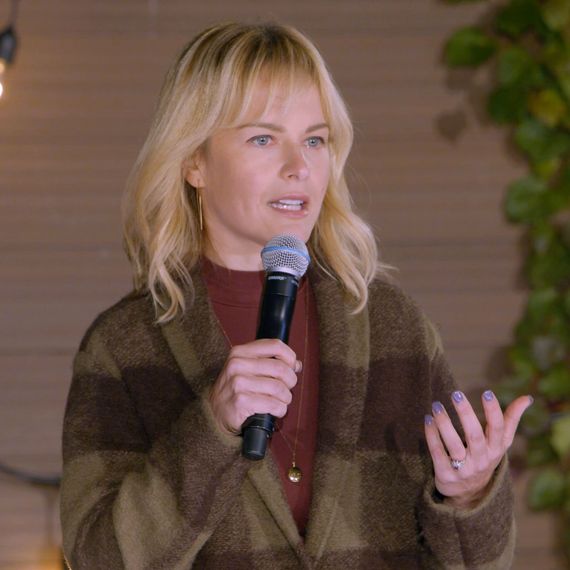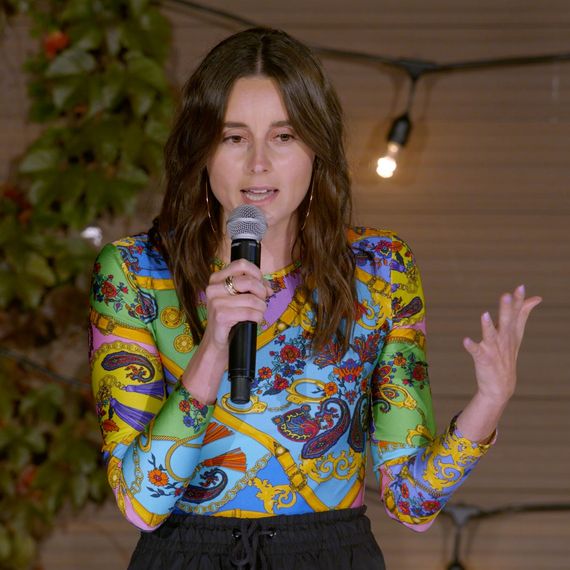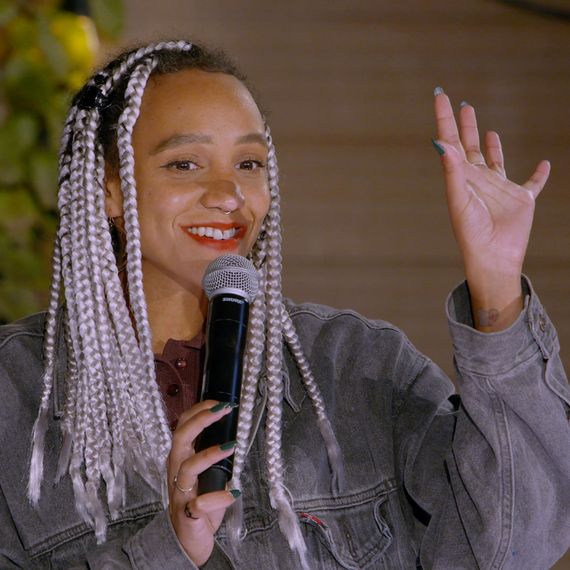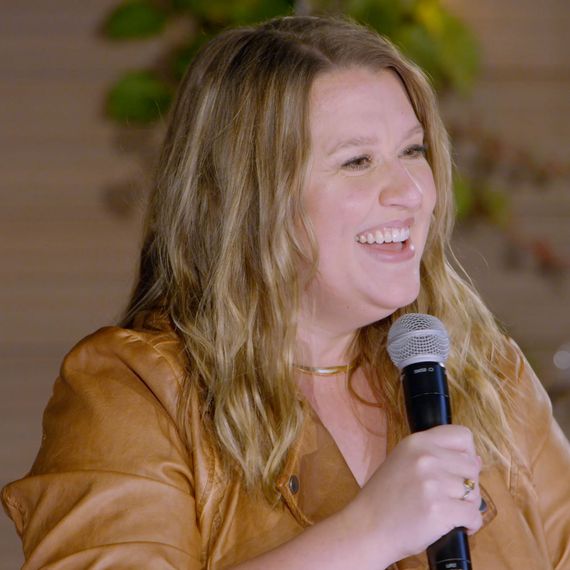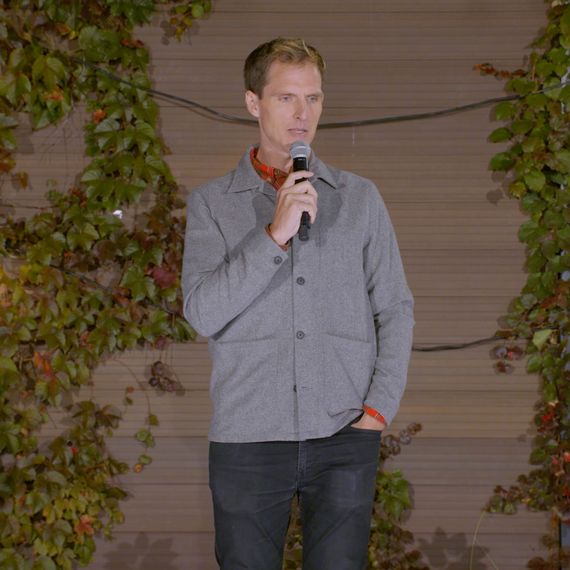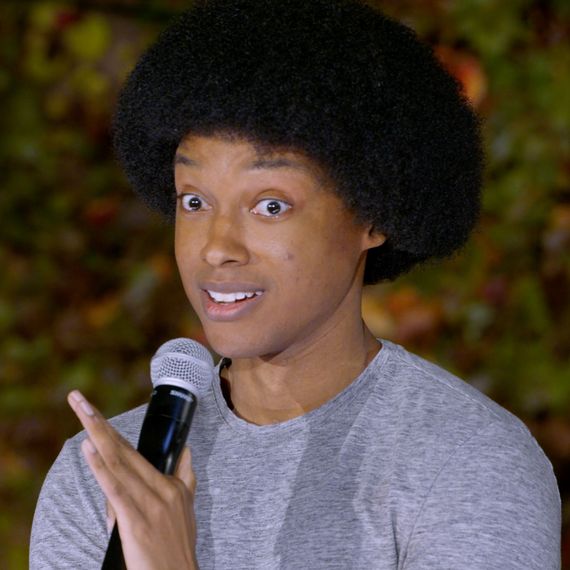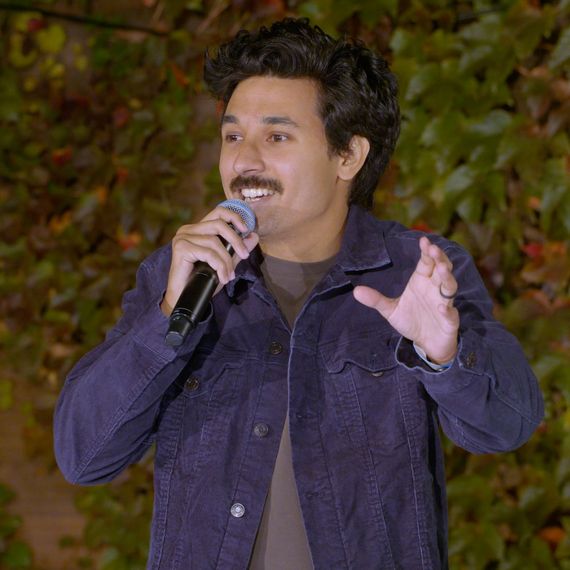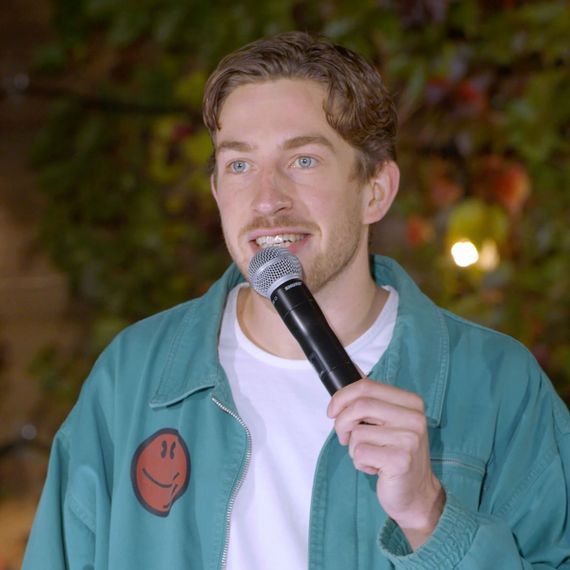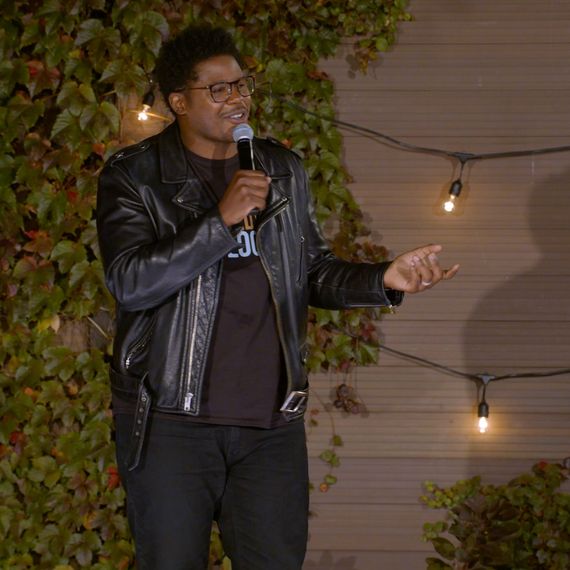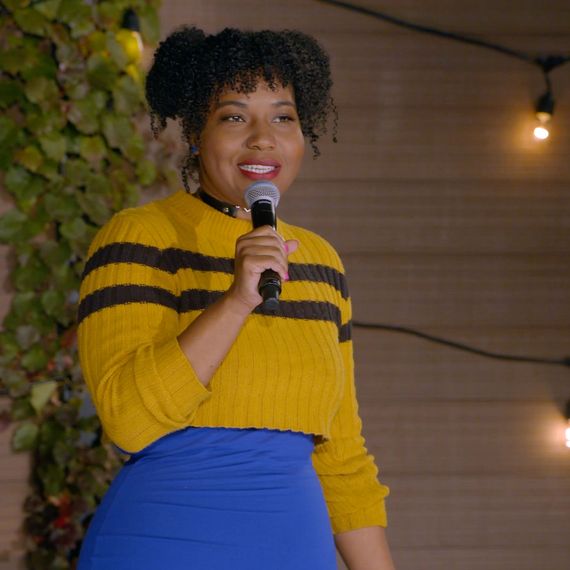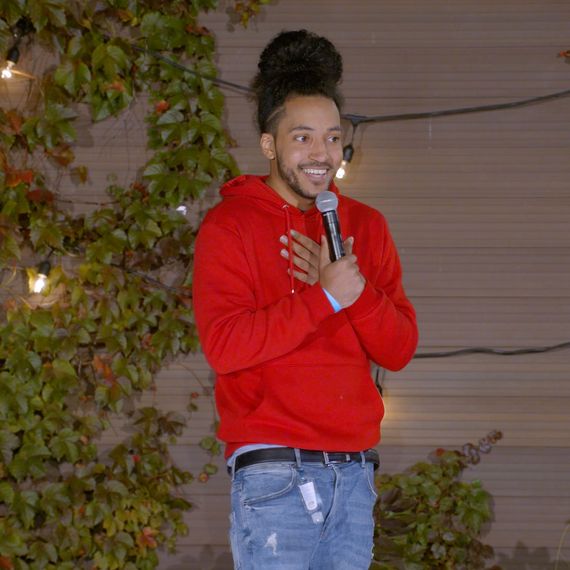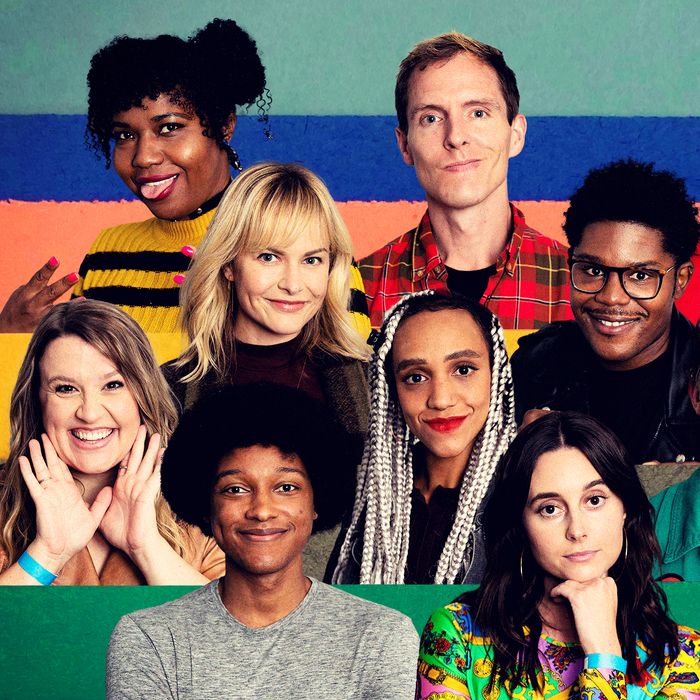
This month, the new season of Comedy Central Stand-Up Featuring is streaming new sets every week on Comedy Central’s Stand-Up YouTube channel. Unlike previous seasons, this one was filmed at an outdoor venue that Comedy Central built, and rigorous precautions were taken to ensure the 11 comics chosen for the season could perform safely in front of a live audience. Despite the current lack of access to traditional clubs and venues comics might use to work out material, each set is a unique primer of a comedian’s voice, style, interests, and personality.
Vulture spoke with this year’s lineup of Featuring comedians about how pivoting to virtual and outdoor shows in 2020 were (and weren’t) helpful for preparing material, lessons they learned about performing during the pandemic, and how they see themselves evolving as performers in response to the radical shift we’ve all faced this year.
Rosebud Baker
Zoom shows have mainly come in handy when I needed to remember my set, and that’s pretty much all they’re good for. I’ve tried jokes out on Zoom. Some of them translate to the stage, and some of them don’t, so it’s not a reliable way to try out new material in my experience. It’s helped me to remember old jokes, remember the order of things. It’s helped to work through ideas that I think might be funny and then see if I can make them work for the stage. I wouldn’t call it a transition, because it’s something I refuse to be used to. It’s a placebo, and you know it’s a placebo. But I’m a comic, and I want to talk and try new things out and work on my jokes, so if that’s the only thing available, I’ll try it.
I feel like this time has absolutely fundamentally changed how I approach material. The challenge as a comic is: How is anything you’re saying unique when we’re all pretty much living the same life and having the same experience? I try to be more personal than observational, and so this has forced me to dig deeper in that sense. At the beginning of this, my whole life was comedy. It’s all I did, all I focused on. Since COVID happened, I’ve gotten engaged. I’ve gotten married. I’ve started asking myself about what I want my life to be like, and what I want it to look like, and what experience I want to have. I’ve started thinking about having a kid, which is something I never considered. I have all these things about the conflicting feelings of a woman that maybe wants to have a kid, but really wants to focus on her career, and how that feels. I’ve got this germ of an idea in that realm that I’m trying to build on.
Mary Beth Barone
At the beginning of quarantine, I was like, I’m writing jokes. I need to put them out, so let’s do the virtual shows. I said yes to everything. After a few weeks, I just realized that instead of scratching the itch, it was just making it worse. You get this taste of what it used to be like without the feedback of an audience. When I found out about doing a live show, I was so nervous because I hadn’t performed since March until we taped it, so I decided the week before I was going to do a few outdoor shows and figure out what of my recent stuff that I’d written in quarantine, mixed with what I’d written previously, I could put together for a six-minute set. It was like performing for the first time. It was very scary. It’s not like you completely lose everything, but when you’re getting up every night almost, it becomes like breathing: You just take the mic and get right into it. But with outdoor shows, the sound isn’t as great; you’re literally working against the wind, against sirens and cop cars and subway trains, so it was hard to figure out exactly what was working and what wasn’t. At the end of the day, I just had to kind of trust myself and say, These are the jokes I want to put out, so this is what I’m going to do.
I think that the Zoom shows taught me that nothing can replace live performing. I don’t want to say I won’t perform on virtual shows because that’s not the case. I’ve just been saying no for a while now because I don’t think it was beneficial to my skill set as a comedian. You’re not getting instant feedback. I think it’s never going to be a substitute for in person. Learning that in itself was valuable, because it saved me a lot of time and a lot of nights where I would have put on a full face of makeup and put on my ring light, where I could simply watch TV.
Brittany Carney
I think that because Zoom comedy is so often bizarre — the timing is all weird — you’re not getting laughter at the same time if at all. It often feels like you’re talking to yourself in a dark room. I think Zoom comedy through the spring helped me become really aware of my timing and pacing, and how to sound like most naturally myself, because there wasn’t a full audience that was staring at you and you had to also respond to all of these outside physical elements. It helped me become even more measured and clear in my delivery of material.
I think outside comedy just helped to figure out how to reconnect with my energy. Oftentimes, there’s walls, but I also feel like doing well at outside comedy requires you to perform with your whole body. So when it came time for the Comedy Central taping, I wanted to provide an introduction to me as a comedian. Because I had never had that in that capacity before, I wanted to try and do new material, and I wanted to explore some ideas that I had been thinking through — like the thing I did about underrated sex playlist music was specifically something that came from doing a Zoom show. Because Zoom provided outlets to do jokes in other structures, I had fun making lists, because you could put a punch line on the end and include other ideas you think are funny.
Christi Chiello
More than deciding which jokes to do, it was deciding how I was going to make it all flow. I also always have to fight the want to talk to the crowd. In every joke I do and everything I say, I always wish I could engage the crowd, so I’m actively trying to get away from that a bit. I was apprehensive about doing crowd work during the taping. I didn’t know if they would want to be talked to and how much and literally how this was going to work. A lot of it felt new for me, but that’s how you grow and how you get better.
It surprised me, not because I prepared the set I prepared but I love any moment that’s going to keep me present. I like being a little surprised when I come offstage by how Oh, that’s how that joke went tonight. I think it’s funny because pre-corona, my answers would have been very different. I was never comfortable with the quiet, and I always wanted the fast turnaround. I think part of me has become more comfortable with not having a quicker turnaround and letting it sit and build, but there is a part of me that thinks I’m never going to be totally comfortable without the laugh, without the response. It’s strange.
Just to be totally honest, I think that I could have fallen on my face on the stage and still have been so happy because it was performing live, and it was some semblance of normalcy that I haven’t had in a very long time. So there was no way that couldn’t have been an amazing night for me regardless of my set.
Andy Haynes
I hated doing Zoom shows at first, but it eventually got to a place where I could enjoy myself. When outdoor shows came along, it was such a godsend. It felt like coming home after a war or something to get to perform for a physical audience. I definitely have a lot of resentment toward people who are anti-masking out of this weird “I’m tougher than a molecular virus” thing. There’s a lot of ignorance that informs men in general, but also America, so I had a real resentment and wanted to start talking about it.
I would say my reaction to the pandemic is twofold. One, it’s made me so grateful for comedy and made me kind of really reassess the way I approach it as a discipline. I like to write onstage, but that is not the show people signed up for. If I’m going to do a show, they gotta leave with more than they came for. Overall, I really want to give these people a good show and be grateful for every set, because when it was gone, I really felt like I lost that main thing I’d been doing for almost 17 years.
On the other side — and I hate to say this — there’s been a recent thing where I’m like, Well, I’m going to focus on a lot more writing and digital stuff than actual live stand-up, because it’s so truncated or compromised right now. I love it, and I’m still grateful for every time I get up, but maybe I’ll just wait until this vaccine thing happens, and I’ll write the pilots I’ve been meaning to write. I’ll write the essays and try to find something that works better in these conditions. I know it’s depressing, but I also know stand-up isn’t going to die because we don’t do it for a year.
Josh Johnson
There are plenty of great rooftop shows that are safe and feel like you’re doing it again and it’s 2018 or something. Then there are some that are bound by the elements. If you’re doing an outdoor show next to an airport, don’t expect your timing to go perfectly, because there’ll be a lot of planes overhead. I think as comics, we’re all doing the best with what we have.
I feel like I’ve been doing it long enough that some of it comes second nature, but then there’s a much bigger part at play that’s trying to exude that the set isn’t happening in a potentially apocalyptic year. I definitely pay attention to spacing and an audience’s mood and the way they ride the wave of the joke, but also it’s important to be thinking ahead, and to be thinking that this is going to be around in perpetuity, so what’s it going to look like to someone who doesn’t have a sense of the set from a historical standpoint? I love the idea that ten years from now, someone can watch that set who wasn’t living in 2020 in a conscious way — maybe they were really little — and still pull away Oh wow, this is really funny.
I really feel like this year for me, both performance-wise and the way I think about and catalogue jokes, really came and killed the idea and destroyed the design. I think the way I’ve started to create is much more of an eclectic approach. As much as I want to get back to a place where I am at that level with that rhythm of doing a bunch of sets a night and adjusting things that need to be adjusted, I feel like my mind is opened, and I’m not afraid of failing in a way that I was previously. Now I’m just like, Look, I’m blessed to be alive and healthy. I’m blessed to still be able to create. I know I’m not going to hit it out of the park every time.
Ismael Loutfi
With the Zoom shows, it’s really difficult, because sometimes they sort of have, like, two people who have their mic on and are sort of designated laughers and sometimes you just guess based on their faces and names whether or not they’re going to be really sensitive about a joke that has a bad word in it. But then other times everybody’s mic is off, and you’re just in this existential, Zen-like dark cavern of silence, and in that case, I probably wouldn’t do that joke at all, because you don’t want to be putting yourself in a position where there’s silence in the world while you’re saying something outrageous. It’s like Brian Regan’s problem, to some degree, where if you’re doing big act-outs and they don’t get a big laugh, you look really dumb. If you’re doing a Disturbed sound effect to silence in your bedroom, you’re embarrassed to see your dog afterward.
Even though some bits would work well on Zoom, I don’t think the Zoom shows helped my joke writing, to be honest. I felt like, a lot of the time, comics are doing these Zoom shows because they desperately need to be doing what is perceived as comedy. They need it. I consider myself to have a foot in that world, for sure. I don’t think that performing the Zoom shows helped with the joke writing as much as it just made me feel, Okay, I’m still a comedian, even though I’m not legally allowed to do it, really. I feel like I got a lot more value from the shows where you’re actually taking a bit of a risk by performing in front of people, because I think that’s kind of a necessity for stand-up to really be working.
Gavin Matts
I haven’t done a Zoom show. It’s not what I set out to do, doing comedy on Zoom, so I’m kind of anti-Zoom in maybe a purist way. I just want something to be mad about, I guess, so I decided not to do them. Before the pandemic, I was doing stand-up every night. When I ran a set for late night or Comedy Central, I’d have run the set so many times. This was different, because I’d maybe done 12 sets, and I found out I was doing the show like a week before. I think I was kind of the last addition, so I didn’t really get to practice the set because I quarantined. I didn’t really know how it was going to go.
The outdoor shows just made me think, I am just doing comedy for me again, so I’m writing what I think is funny, so that was kind of freeing. When you’re in a club, you need to get laughs to get booked again. With the outdoor shows, I was just like, This is a thing I’m doing now, so I can kind of do what I want. There was no pressure. With outside [shows], you can’t really hear laughs, so there’s no real point in going for them. It’s made me really not care as much about people being onboard, so to speak. Just because if I do a set here or in North Carolina, some red state, I’m not going to change my set for a certain type of person, but with an outdoor space and not being able to hear laughs, you just have to be in your own rhythm.
Monroe Martin
I did more outdoor shows than Zoom. The Zoom shows just didn’t work for me. I was up there giving them my all, and then you’d hear four robotic laughs like “Ah, ah, ah, ah,” and I was like No, I can’t do this. Then I started doing the outside shows, and some of them were really raw, where you’re just out there in Central Park. There’s maybe ten people sitting close to you, but they can’t really hear you, and there are Frisbees being thrown. So I was like, Okay, I still need to work this material out. If I can make at least the people closest to me laugh, I know the bit is working. I was doing that for at least a couple of months. Then the shows started getting better, which actually helped me prepare for how Comedy Central did their shows. They started being rooftop shows and shows in the back of restaurants, where it’s COVID-safe. Everybody’s spread out, but you actually have a microphone and stuff. By the time I got to those, I was already shaping the set out.
For me, the park shows helped the most. I feel like there are definitely comics who benefit off the Zoom shows and know how to work it. Some comics don’t care about audience reaction. Some comics write out their jokes like, Here’s the setup, here’s the punch line, and they don’t need your reaction. For me, I’m still figuring out the joke as I’m telling it. I’m still gauging, All right, this is how they kind of reacted. What should I take out? What should I not say? What should I say? I’m always adding and subtracting from jokes until I record it, because jokes aren’t done until they’re on TV.
The outdoor shows were the most helpful for me, because I still got to be in front of the audience and just gauge them and see what I could talk about and see what I had to work a little harder to win them over with. With Zoom shows, I didn’t really get that. That’s just the type of comic I am. I need that energy. I like that energy, because that’s what got me into comedy: being able to control a room with your thoughts and stuff like that. With Zoom, I lose that power.
Rebecca O’Neal
During quarantine, I have started using Twitter as a pre-pre-pre–open mic. I basically started diagramming my jokes on Twitter. I would literally put all of the good tweets into a Google Doc and go through them at a Zoom show. The one thing about Zoom is that it did make me dependent on having a set list in my line of sight at all times, so by the time the Comedy Central taping came up, I had no memory left for jokes or their running order. When outdoor shows came back, I would take the ones that worked well on Zoom to Prospect Park, or the backyard of a café, or a roof, or wherever we were telling jokes that day. I got to throw tags, all my witticisms and turns of phrases, to see if they actually hit in front of human people. I was able to get in enough sets to work it out to a point where I felt comfortable doing the taping.
One thing I did notice in Zoom and in real life is how grateful audiences are for comedy. They’re just grateful to be outdoors at a thing. I was able to work out material in a really positive environment. A lot of comedians, when we finally saw each other, we all got to talk about all the things we were experiencing together. We realized audiences were more patient than before. A lot of us had been out of practice for months by the time we got up again for the first time. Some at the recording were up for the first time in six months. I was very happy I got to get up before that, but audiences were very grateful, very patient. I think everybody really enjoyed seeing how other humans were processing this thing that we’re all in at the same time. So I really learned just to bring my own perspective to it. Just trust your voice and what you feel, because everyone’s feeling something.
Eagle Witt
It’s funny — when I started doing Zoom shows, I was so hyped. I was in a better mood. I told my girl, “Yo, ain’t I happier now? I’m happier. I did stand-up.” By the third Zoom show, it was depressing. [Laughs.] I was like “I hate this so much.” Sometimes now I’ll say yes to a Zoom show, but it’s always by accident. Somebody will hit me up and be like, “You want to do my show on the 15th?” I’ll be like, “Hell, yeah,” thinking it’s an outdoor show. Then they’re always like, “All right, here’s the Zoom link,” and I’m like, “Fuck!”
You know what they help with though? Saying jokes. It’s almost like open mics again. The best thing about open mics is that you get to say the joke, and that helps. It helps your mind figure out how to construct it. The problem is that it’s not people in front of you, so not everything that works on Zoom will work in person. Sometimes it gives you false confidence. I’ve gone to real outdoor shows with jokes that killed on Zoom, and they bomb. Or vice versa. I think it’s because on Zoom, a lot of those shows were during lockdown, so people were experiencing the lockdown as they were watching you, so it was super-relatable. But once you go to these outdoor shows, people are living their lives to some extent now. It’s different, for sure, but they’re outside, so you do those same jokes and they’re like, I guess. They don’t really care too much.
I mean, I didn’t do a lot of outdoor shows before the taping. I went upstate for a good chunk of the pandemic. Taping was shortly after that. I did a couple of outdoor shows, and then the taping, and I was like, Ohhh, I’m ready.


